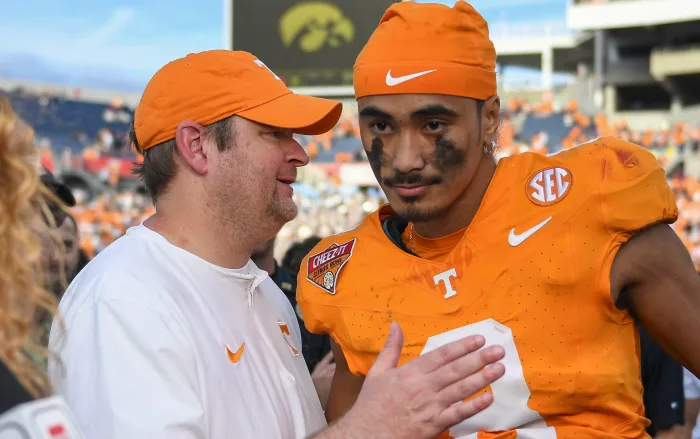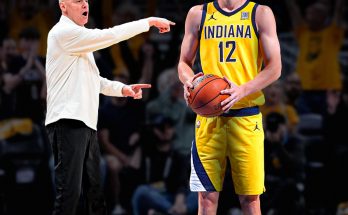Unknowingly, when he left Rocky Top, quarterback Nico Iamaleava offered the Tennessee Vols a very helpful present.
In the world of college football, every transfer, every draft choice, every recruit has the potential to change the future of a program. Some departures are celebrated for the talent that they leave behind, others for the opportunities they present. In the case of Nico Iamaleava’s exit from Rocky Top, the Tennessee Volunteers football program received a gift, one that wasn’t immediately obvious but will likely shape the team’s future in profound ways. While the attention of Tennessee fans and the national media has been on Iamaleava’s potential, his decision to leave left a kind of inadvertent present for the Vols—one that could ultimately prove more impactful than anything he could have accomplished on the field.
When Nico Iamaleava first committed to the University of Tennessee, it felt like the beginning of something special. The hype surrounding the 5-star recruit, a California native with a rocket arm, was overwhelming. As one of the most highly touted quarterback prospects in recent years, Iamaleava brought with him the hopes and dreams of an entire fan base. Tennessee had been in a rebuilding phase for several years under head coach Josh Heupel, and the arrival of a player with such star power was seen as the spark that could reignite the Vols and bring them back into national contention.
However, with such hype came intense expectations. A quarterback with Iamaleava’s pedigree isn’t just expected to contribute; he’s expected to lead, to set records, and to be the face of the program. The weight of this pressure is often underestimated, and it can have unintended consequences—not only on the player himself but also on the team as a whole.
For Nico, the expectations were palpable. It wasn’t just about what he could bring to the offense in terms of talent; it was about how quickly he could step into a system that had seen success under the leadership of Hendon Hooker. Tennessee had just experienced its most successful season in years, including a shocking upset of Alabama and a near-miss in the College Football Playoff race. In the eyes of many, Iamaleava was expected to maintain that momentum—if not surpass it.
Yet, by leaving Tennessee behind before fully realizing this potential, Iamaleava inadvertently created the conditions for a better future, not only for himself but also for the Volunteers.
When Iamaleava made his decision to leave Tennessee, many fans were disheartened. There were questions about what went wrong and how the program would recover. But when one steps back and analyzes the situation more closely, it’s clear that his departure might be a blessing in disguise for the Volunteers.
First and foremost, the quarterback position now became an open competition. It’s a well-known fact in college football that there is no such thing as a permanent starting spot—especially at quarterback. With Iamaleava gone, Heupel and his staff were given a unique opportunity to reassess the team’s future from the quarterback position, without being locked into the idea that they needed to make Iamaleava work no matter what.
Tennessee’s offensive system, known for its fast-paced, high-octane attack, requires a quarterback who not only has the ability to make deep throws but also the poise and decision-making to handle the pressure of running such a system. Iamaleava’s skill set certainly fit the mold, but his departure has forced Tennessee to search for a quarterback who can excel in this system without the looming shadow of unmet expectations. The Vols now have a chance to develop a more organic offensive leader, one who is ready to take on the responsibility without the pressure of constantly being compared to past quarterbacks or being deemed “the next big thing.”
Moreover, Iamaleava’s exit opens the door for other talents within the program to rise. Quarterbacks like Tayven Jackson or even freshmen might now have the chance to compete for the starting role. With a new face under center, Tennessee can re-establish its identity as a program that develops talent rather than relying on pre-existing reputations. The Vols can now cultivate a quarterback who is a true product of the system rather than someone brought in to save the day.
While it might seem counterintuitive, Iamaleava’s departure actually could help strengthen the depth and overall culture of the Tennessee football program. One of the most important aspects of any successful college football team is its ability to develop leadership beyond just the starting quarterback. The best teams aren’t just built around a singular star; they thrive on a culture of competition, accountability, and collaboration.
With Iamaleava’s departure, Tennessee has the opportunity to reset the internal dynamic of the team. The Vols now have to rely on a quarterback who has earned the spot, not just because of their five-star pedigree but because they’ve put in the work and demonstrated leadership. This could be an important moment for the culture of the team, as it gives the entire roster an opportunity to prove that they are more than just one player.
Tennessee’s coaching staff, particularly under Josh Heupel, has shown a remarkable ability to develop players and get the best out of their skill sets. Heupel’s offense isn’t designed to run solely on the talent of one individual player. His system, with its emphasis on tempo, spacing, and efficiency, works best when all the pieces are clicking together. With Iamaleava’s departure, Heupel can build the offense around a quarterback who is ready to take full ownership of that system.
While the loss of a player of Iamaleava’s caliber might seem like a blow to the program in terms of recruiting momentum, it could turn out to be a net positive in the long run. It’s often said that a football program’s success is determined by the way it handles adversity—how a team reacts when things don’t go according to plan. Iamaleava’s exit, though initially a blow to Tennessee’s recruiting pitch, shows the program’s resilience and adaptability.
By showing that they are not tied to any one player and that they have the ability to continue succeeding even in the face of unexpected departures, the Vols can prove to recruits that Tennessee is a program that focuses on development, culture, and winning over individual accolades. Top recruits in future classes may be more drawn to Tennessee if they see a system that is focused on team success rather than relying on a single, star player to carry the load.
Moreover, Tennessee’s success or failure in the wake of Iamaleava’s departure will speak volumes about the coaching staff’s ability to maximize talent and manage expectations. If Tennessee can continue to win without him and find success with a more humble, less heralded quarterback, recruits will see that the Vols have a proven track record of success with diverse quarterbacks who have the ability to thrive in Heupel’s system.
The departure of Nico Iamaleava marked the end of an era—an era in which Tennessee was trying to build its future around one player. But in a sense, it also marked the beginning of a new era, one in which the Vols are free to shape their future with more flexibility and less external pressure.
Tennessee no longer has to carry the weight of a “savior” quarterback. The expectations on the program can be more realistic, allowing for organic growth rather than placing all the pressure on the shoulders of one individual. While Iamaleava’s talent could have brought great things to the Vols, his decision to leave gives Tennessee the opportunity to redefine its future—one where success is built from the ground up and doesn’t depend on any one individual.
In hindsight, Nico Iamaleava’s departure from Rocky Top may have been a blessing in disguise. The lessons learned from his exit, coupled with the chance to reset the quarterback position, could prove to be the most important gift he ever gave to the Volunteers. The Vols now have the chance to build their future not on the back of one player but on the collective strength of a program that has learned how to thrive in the face of adversity. The future is wide open, and in the end, that might be the greatest gift of all.



